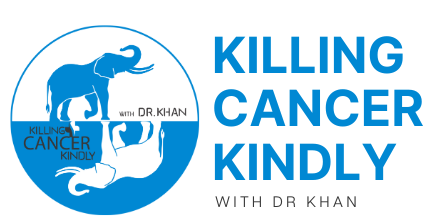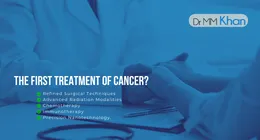Cancer remains one of the most concerning diseases worldwide, with its diagnosis often equating to fear and uncertainty. However, while cancer continues to affect millions, significant progress is being made. With increased awareness, early screening, improved treatment options and preventative lifestyle measures, the tide is turning. In this two-part blog post, I will provide an overview of where we stand when it comes to preventing and treating cancer, drawing from insights and decades of oncology experience of Dr. Mohammad Muneeb Khan.
Dr. Khan is an NHS Consultant Clinical Oncologist in the UK, with over 25 years of experience treating and researching cancer. As an expert in the field, he offers an insightful perspective into the advances being made against cancer, along with prudent advice on prevention strategies. By spreading awareness and following recommended screening guidelines, patients can diagnose cancer in early curable stages. Combined with comprehensive lifestyle changes, we can significantly reduce our cancer risk and mortality rates worldwide.
While cancer remains a challenging disease, knowledge and proactive actions empower us in the fight against it. Increased prevention, early detection and better treatments are helping turn the tide against cancer. In the ensuing parts of this blog post, I will elaborate on the promising developments occurring in cancer care and prevention that should give us hope for the future.
Cancer is Becoming More Treatable and Curable
In recent years, the narrative surrounding cancer has begun to shift from one of despair to one of hope. Dr. Khan’s vast expertise, spanning over two decades, is a testament to the evolving landscape of cancer treatment. As a Clinical Oncologist, he has witnessed the remarkable progress that has been made in the fight against this disease. Through meticulous research, relentless dedication, and a profound commitment to patient well-being, medical practitioners like Dr. Khan have unlocked new avenues for conquering cancer.
For many, a cancer diagnosis once equated to a grim outlook. However, the trajectory is changing. Common cancers, such as breast and prostate cancer, have witnessed significant improvements in treatment outcomes. Early detection, facilitated by screening initiatives, has emerged as a potent weapon in the battle against cancer. In fact, statistics reveal that both prostate and breast cancer can be cured over 90% of the time when detected in their nascent stages.
The emergence of cutting-edge treatments, coupled with the pioneering efforts of clinical oncologists like Dr. Khan, has turned the tide in favor of patients. While challenges persist, progress has undeniably been made, offering a ray of optimism for those grappling with cancer’s uncertainty.
Some key developments that have improved cancer treatment and outcomes include:
- Targeted Therapies: These innovative drugs target specific mutations or proteins that allow cancer cells to grow uncontrollably. They help block tumor growth while having less impact on healthy cells, reducing side effects.
- Immunotherapy: This harnesses the body’s immune system to seek out and destroy cancer cells. Checkpoint inhibitor drugs are one example that have shown tremendous promise against cancers like melanoma.
- Precision Medicine: Customizing treatment by analyzing the genetics and specific features of a tumor allows for more personalized and effective treatment protocols.
- Radiation Therapy Advancements: Newer techniques like proton beam therapy allow high-dose radiation to be delivered more precisely to tumors, improving outcomes.
- Less-Invasive Surgery: Minimally invasive robotic and laparoscopic surgery options reduce risk, complications, recovery times, and improve results.
- Supportive Care: Better management of treatment side effects enables patients to complete prescribed therapy regimens, enhancing survival.
While later-stage cancers remain challenging to treat, remission and long-term control are becoming more achievable with these advances. Clinical oncologists are also developing more effective treatment combinations tailored to individual cancer cases.
Prevention is Key to Beating the Cancer Pandemic
However, treating cancer is only one part of the comprehensive strategy needed against the cancer pandemic. As Dr. Khan asserts, prevention is the cornerstone. The statistics on rising lifetime cancer risk demand our attention. Studies estimate the lifetime risk of developing cancer has risen from 25% in the 1990s to 50% in 2017, with projections estimating it could reach 60% by 2030.
Dr. Khan’s new book “You’ll Wish You Were an Elephant: Killing Cancer Kindly” is a valuable read for anyone looking to understand cancer risks and prevention better. The book provides a wealth of insightful information and evidence-based strategies focused on lifestyle changes to reduce cancer risk. Health professionals, doctors, and the general public concerned about cancer would benefit greatly from reading this comprehensive guide.
By empowering readers with the latest knowledge and research on risk factors and prevention approaches, this book can play an important role in the fight against cancer. Dr. Khan has synthesized a great deal of cutting-edge information into an accessible resource for readers seeking to inform themselves. Knowledge is power when it comes to lowering our individual and collective cancer risk. This book aims to educate, empower and provide readers with the tools to make positive lifestyle choices that could save lives.
The key point remains that comprehensive prevention strategies, combined with continued innovation in cancer treatment, provide hope in the ongoing battle against cancer. Widespread awareness and positive lifestyle changes can help reduce the projected trajectory of cancer rates worldwide.
Some key risk factors that contribute to rising cancer rates include:
- Lack of Exercise: Low physical activity and excess weight gain promote obesity, chronic inflammation, and hormonal imbalances that encourage cancer growth.
- Smoking and Alcohol Abuse: Tobacco and alcohol directly damage tissues and cells, leading to genetic mutations. They significantly increase cancer risk.
- Poor Diet: Diets high in processed foods, sugars, refined carbs and low in fiber alter metabolic pathways in ways that can trigger cancer.
- Chronic Stress: Prolonged stress triggers hormonal changes and inflammation that depresses the immune system’s ability to detect and destroy cancerous cells.
- Environmental Pollutants: Carcinogenic substances in the environment enter our bodies and interact with DNA in harmful ways, promoting malignancies.
By generating awareness about such modifiable risk factors for cancer, prevention can be made a priority in our communities. Dr. Khan’s book highlights actionable lifestyle changes that can curb these risks, giving readers the knowledge to protect themselves proactively.
Lifestyle Changes and Awareness Are Our Best Weapons
While advances in cancer treatment offer hope, preventing its occurrence in the first place remains the most powerful tool at our disposal. As Dr. Khan underscores in his book “You’ll Wish You Were an Elephant: Killing Cancer Kindly,” knowledge and proactive lifestyle changes can help safeguard us from cancer’s grasp. By combating key risk factors, we can curb the trajectory of cancer rates worldwide.
Dietary Changes
One of the most impactful prevention strategies involves adopting a healthier diet. Limiting processed and sugary foods while increasing plant-based whole foods can optimize our intake of antioxidants, fiber, and nutrients that suppress cancer growth. Some beneficial dietary changes include:
- Eating a rainbow of fruits and vegetables daily, especially dark leafy greens, berries, citrus fruits, and cruciferous vegetables like broccoli.
- Choosing healthy fats like olive oil and avocados while avoiding saturated fats.
- Incorporating nuts, seeds, legumes, and whole grains for fiber, vitamins, and minerals.
- Drinking green tea, which contains EGCG, a potent antioxidant that protects against cell damage.
- Restricting consumption of processed meat and opting for lean protein sources like fish and poultry.
- Staying adequately hydrated by drinking sufficient water through the day.
Exercise
Regular physical activity is strongly linked to lower cancer risk, in addition to boosting overall health. Aim for at least 150 minutes of moderate exercise or 75 minutes of vigorous exercise weekly. Activities like brisk walking, swimming, cycling, and strength training help control weight, reduce inflammation, and keep hormones balanced.
Stress Management
Chronic stress weakens immunity and promotes systemic inflammation. Practicing activities like yoga, meditation, deep breathing, journaling, or music therapy can activate the body’s relaxation response. Getting 7-8 hours of quality sleep nightly also bolsters the immune system.
Screening and Early Detection: Screening tests like mammography, colonoscopy, Pap smears, and PSA testing enable early detection and prompt treatment of precancerous lesions and cancerous tumors – vastly improving survival rates. Especially for those at higher risk, regular screening as per medical guidelines is key.
Avoid Tobacco
Smoking accounts for 30% of all cancer deaths. Quitting smoking and avoiding all forms of tobacco are among the biggest gifts we can give ourselves and our loved ones. Dr. Khan provides excellent resources for quitting smoking successfully in his book.
Substance Abuse Avoidance: Excessive alcohol consumption has been linked to several cancers, and illicit drugs also weaken immune function. Avoiding substance abuse improves cancer protection tremendously.
Environmental Awareness
Reducing exposure to pollutants, chemicals, plastics, and other contaminants present in our homes, communities, and workplaces via conscious avoidance and policy changes can lower cancer risks stemming from our external environment.
By becoming informed about such prevention strategies and implementing them proactively through small daily changes, we can empower ourselves in the fight against cancer.
The Future of Cancer Prevention and Cure
The promising news is that concerted efforts focused on awareness and prevention, combined with continued innovation in cancer treatment, can dramatically alter global cancer statistics for the better. As Dr. Khan highlights in his book, the dream of restricting cancer to less than a 5% lifetime risk is achievable. We already have the knowledge and tools to prevent up to 50% of cancers. By deploying a multipronged strategy, it is realistic to envision cancer becoming a rare occurrence rather than a probable cause of death.
Public health initiatives to spread awareness, coupled with policy-level changes targeting risk factors, can bring about a wholesale shift in how we tackle the cancer burden. Dr. Khan also underscores the need for the healthcare industry to align priorities and resources toward prevention in a concerted manner.
With diligence and commitment, cancer could follow the trajectory of deadly infectious diseases that were once common but are now rare occurrences thanks to vaccination and public health strategies. Just as targeted efforts expanded life expectancy and quality of life for heart disease, diabetes, and HIV/AIDS patients, the same is possible for cancer.
Although the war against cancer continues, we are decidedly no longer helpless against this formidable foe. Armed with knowledge, prevention strategies, screening programs, and treatment breakthroughs, the tide is turning. By spreading awareness and embracing proactive lifestyle changes, we can collectively move towards a world in which cancer’s shadow lifts – and better health prevails.


